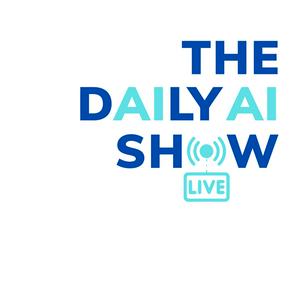Runway Pivots and OpenAI Connector Frustrations (Ep. 535)
Want to keep the conversation going?Join our Slack community at thedailyaishowcommunity.comIntroIt’s Friday, which means it’s time for “Recaps & Rabbit Holes.” Beth, Jimmy, and Carl share the latest AI developments that caught their attention, from competing AI film festivals to frustrations with enterprise adoption. The conversation flows across creativity, credits, connectors, corporate resistance, and what it really takes to build AI-native companies.Key Points Discussed• Chroma Awards announced as a new AI media festival with backing from 11 Labs, Fowl, Freepik, and CapCut, competing directly with Runway’s long-running AI film competition.• Runway pivots to a platform model, integrating external models like V3 instead of relying only on its in-house systems. Debate over whether this signals weakness or smart adaptation.• Unlimited ideation tiers like Runway’s “slow server” plan are valuable for creatives, allowing experimentation without running out of credits.• Comparison of Runway’s strategy with Midjourney’s flexible editing and remixing tools, showing how platforms can expand beyond just generative output.• Discussion of credits versus subscriptions: Sam Altman hinted at moving ChatGPT toward credits, while Perplexity already bundles API credits into its subscription tiers.• Frustrations with OpenAI connectors: limited to “read-only” use, while Claude’s MCP offers deeper integration and real action-taking capabilities.• Panel shares experiences with GPT-5 file generation quirks: sometimes hallucinating files or failing to persist outputs, with short session windows compounding the problem.• Broader reflection on how businesses resist AI adoption due to legacy processes, change management, and lack of literacy in what AI can do.• Native AI companies are seen as the real disruptors, unburdened by outdated processes and better able to adapt quickly.• Debate over reliability, expectations, and cognitive load—how to get people to adopt partially capable tools without dismissing them as “broken.”• Final takeaway: legacy enterprises must embrace flexibility, accountability, and process redesign if they want to compete with AI-native organizations.Timestamps & Topics00:00:00 🎙️ Show open and Friday “Recaps & Rabbit Holes” kickoff00:01:06 🎬 Chroma Awards announced, competing with Runway’s festival00:04:36 📽️ AI film competitions: mixed-use vs. fully AI-generated content00:07:05 🔄 Runway shifts to external models like V3, platform debate00:12:22 💡 Unlimited ideation tiers and the value for creatives00:13:27 🎨 Midjourney comparisons and broader creative tools00:16:27 💳 Credits vs. subscriptions: Sam Altman and Perplexity’s model00:18:52 🔌 OpenAI connectors vs. Claude MCP for integrations00:22:49 🤖 GPT-5 quirks with file generation and persistence00:26:24 ⏱️ Session window frustrations and workflow hacks00:29:19 📺 South Park episode roasting ChatGPT00:32:03 🗂️ Real-world business process example: file checking bottlenecks00:37:14 🏢 Why enterprise adoption lags—legacy processes and policies00:41:15 📉 AGI benchmarks vs. practical implementation00:42:36 ❄️ AI winter speculation and market reactions00:46:01 🔧 Building flexibility into custom GPTs and automations00:51:36 🔄 Need for robustness, error logging, and multi-model fallbacks00:53:19 ⚖️ Reliability, partial adoption, and cognitive load00:56:50 🏗️ Why AI-native companies will outpace legacy firms01:03:25 📅 Holding companies accountable for adoption progress01:06:21 🌺 Closing notes and Slack inviteHashtags#AIShow #RecapsAndRabbitHoles #Runway #ChromaAwards #AIConnectors #ClaudeMCP #GPT5 #EnterpriseAI #AINative #DailyAIShowThe Daily AI Show Co-Hosts:Andy Halliday, Beth Lyons, Brian Maucere, Eran Malloch, Jyunmi Hatcher, and Karl Yeh



